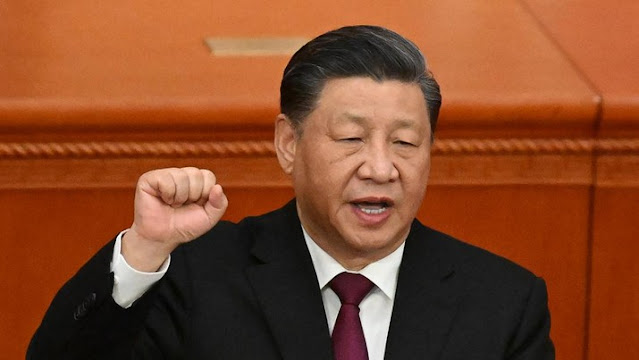This is Xi Jinping's Plan to Bring China to Dominate the World
This is Xi Jinping's Plan to Bring China to Dominate the World

China under the leadership of President Xi Jinping continues to demonstrate its existence as a major country in the world. Beijing has planned how the world should work as China continues to challenge the global leadership of the United States (US).
Xi's vision, although couched in abstract language, encapsulates the Chinese Communist Party's drive to reshape an international system deemed unfair and favor the US and its allies.
"Changes in the world, our times, and important changes in history are taking place in an unprecedented way," Xi said at the Belt and Road Forum in Beijing as reported by CNN International, Friday (10/11/2023).
"China will make relentless efforts to achieve modernization for all countries and strive to build a shared future for mankind."
Viewed as a rival with their increasingly assertive and authoritarian stance, Beijing believes that now is the right time to change the system and the global balance of power to ensure China's rise and resist attempts to counter it.
In recent months, Beijing has promoted its alternative model through major policy documents and new “global initiatives,” as well as speeches, diplomatic meetings, forums, and international gatherings large and small, with the aim of gaining support around the world.
For many observers, the campaign has raised concerns that a world modeled after Beijing's rule is also a world in which traits of its harsh and autocratic rule, such as strict surveillance, censorship, and political repression, could become globally accepted practices.
But China's push comes as war, electoral foreign policy instability and deep political polarization have raised questions about US global leadership.
Meanwhile, pressing issues such as climate change, Russia's war in Ukraine, and Israel's offensive on Gaza have sharpened discussions about whether the West is taking the right approach to its response.
All this coincides with a long-standing call from developing countries to create an international system that allows them to have more say.
Many of these countries have significantly improved their economic ties with Beijing during Xi's administration, including a roughly decade-long $1 trillion global infrastructure development effort called the Belt and Road Initiative.
It remains to be seen how many countries will welcome a future that fits China's worldview. But Xi's apparent push to amplify his message amid a period of unrelenting tensions with Washington is increasing US-China rivalry.
New world order
A more than 13,000-word policy document released by Beijing in September outlined China's vision for global governance and identified what it sees as the sources of today's global challenges.
"The hegemonic, abusive and aggressive actions of some countries against other countries cause huge losses and endanger global security and development," the document said
"Under Xi's global community with a shared future, development and economic stability are prioritized as countries treat each other as equals and work together for shared prosperity."
In the future, the document says each will also be free from political blocs, ideological rivalries and military alliances, and responsible for upholding universal values that have so far been determined by a handful of Western countries.
These initiatives reflect some of Beijing's old talking points and are largely short on details and heavy on rhetoric.
But taken together, analysts say, they show that the US-led system is no longer suited to the current era and signal a concerted push to reshape the post-World War II order.
The current international framework is designed to ensure, at least in theory, that while governments have sovereignty over their countries, they also share the same rules and principles for ensuring peace and upholding the political and human rights of their people.
"What China is saying is 'live and let live', you may not like Russia's domestic politics, you may not like China's political regime. But if you want security, you have to give them space to survive and thrive as well," he said Yun Sun, director of the China program at the Stimson Center think tank in Washington.
https://hix.ai/d/clp5f1bhf03yjoch55rsbji3r
https://hix.ai/d/clp5fs5zv0a3topt8btc2lubf
https://hix.ai/d/clp5fvrc306slmzy4syc4vpo1
https://hix.ai/d/clp5gb1bd042joch57c3809qv
.jpg)

Komentar
Posting Komentar